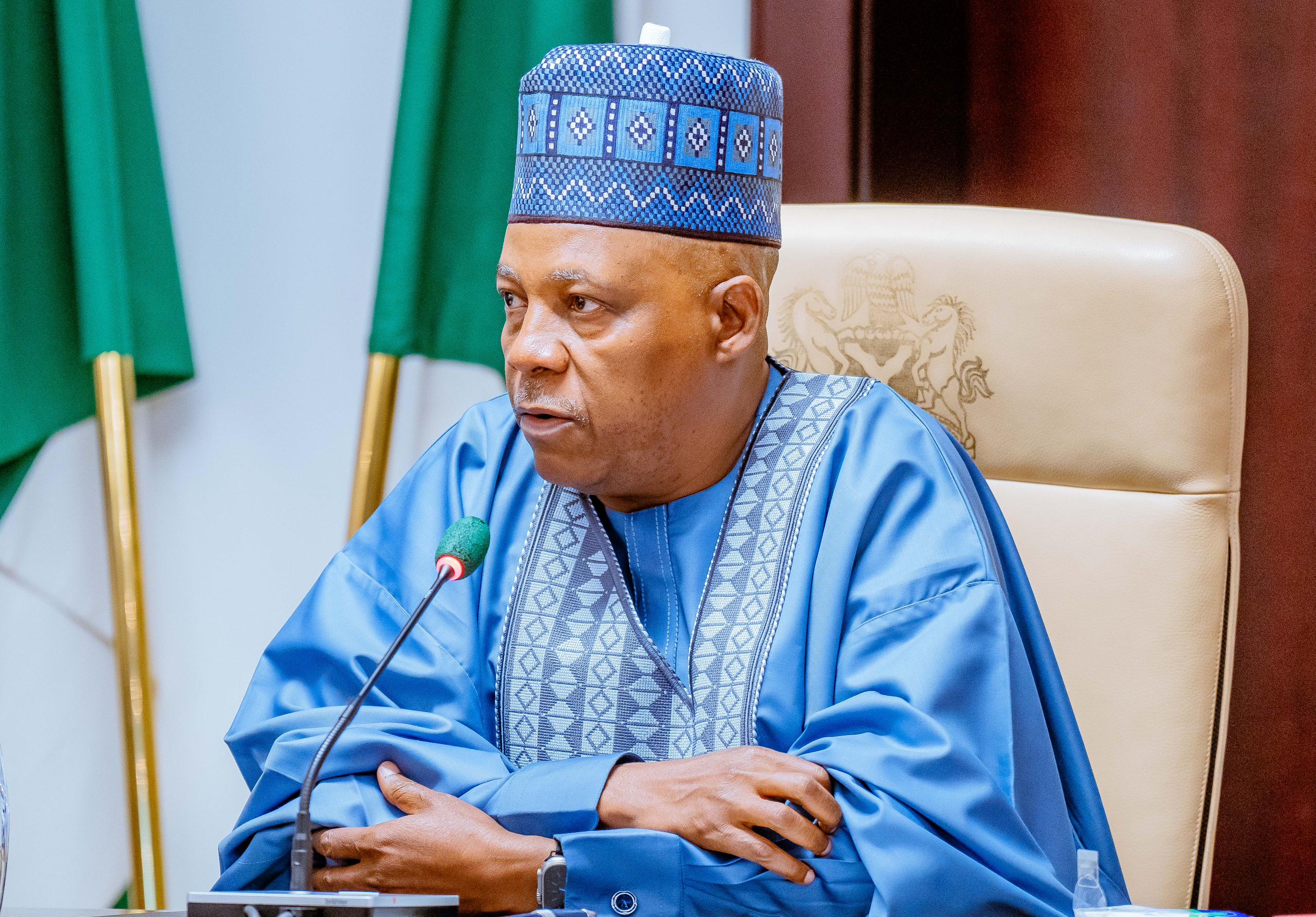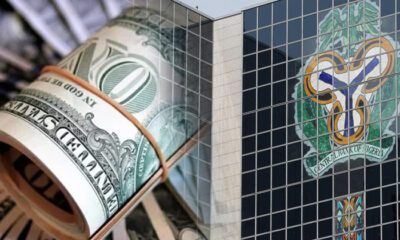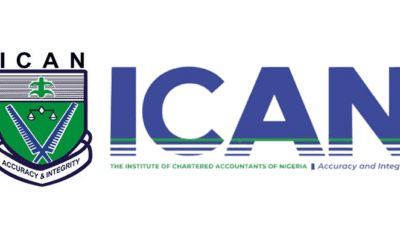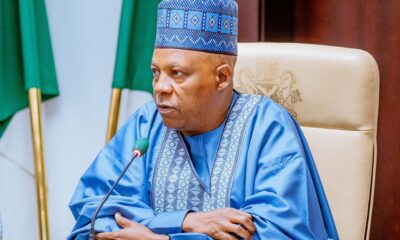Money market
ABCON urges CBN to float Naira
The Association of Bureaux Des Change Operators of Nigeria (ABCON) has urged the Central Bank of Nigeria (CBN) to float the Naira to halt its further depreciation.
The President of ABCON, Alhaji Aminu Gwadabe, made the appeal on Saturday in an interview with journalists in Lagos.
Gwadabe explained that the CBN should do all within its powers to undertake a sustained injection of dollar in the market to reverse the loss in the value of the Naira at the parallel market.
“It might sound counterintuitive but the way out of the current frenzy is to abolish the official fixed exchange rate and allow the Naira to float.
“CBN should contemporaneously undertake a large-scale dollar intervention in the open market that can inspire confidence in the Naira and checkmate the current tailspin.
“Once there is a significant positive movement, the market will react and, in all probability, spur an avalanche of panic selling and further buoy the Naira,” Gwadabe said.
The financial expert said that the CBN could gradually buy back the dollars used in its intervention from the open market at a lower exchange rate for a decent profit.
He argued that the next phase would be to strengthen the Naira in the medium to long-term, adding that both fiscal and monetary policies should be aligned to stimulate the tradable sector.
On CBN’s Monetary Policy Rate (MPR) at 13 per cent, Gwadabe said that the adjusted rate would stifle growth.
He said efforts targeted at reducing inflation in an underperforming economy should focus on stimulating the supply side.
“Increasing the MPR contracts the supply side, it is the wrong prescription.
“Let’s not copy the Americans who target inflation with FED rates to curb money supply, their factors of production have been fully mobilized, ours is at less than 20 per cent and requires stimulation of the supply side.
“Lowering the MPR to around 5 per cent looks more appropriate.
“The U.S. per capita GDP is around 66,000 dollars, ours is $1,500 in real terms which underscores the need for a pro supply side monetary policy,” Gwadabe said.
He said the CBN should reverse his mandate to banks to pay recipients of Diaspora remittances in dollars.
According to him, most of the dollars end up under pillows outside of the mainstream banking system with no utility for capital mobilization and imports.
“It fuels currency substitution, it puts pressure on the Naira exchange rate and inflation and does not have a statutory backing unlike Domiciliary accounts, therefore, it is illegal,” Gwadabe said.
The ABCON boss said that Nigeria had a long history of stifling the tradable sector (oil excluded), first through the Commodity Boards, the Arbitrage Kingpins, the bastion of corruption that straddled the export ecosphere whom Babangida dismembered in 1986.
“They bought low at the farm gates and sold high at the international export markets, much of the difference ended up in their private pockets.
“They impoverished the cocoa, groundnut, palm oil producers, etc. and eventually drove them out of business, not oil.
“Today, they have reincarnated as plethora of gatekeepers including the Nigerian Export Supervision Scheme at the ports exacting tolls from exporters.
“Poor infrastructure, power supply and generally unskilled labor further compound the weakness of our tradable sector.
“Any wonder why Ghana’s annual non-oil export is 13.1 billion dollars, while Nigeria’s is 1.3 billion dollars, We have a long way to go,” Gwadabe said.
He said that all the indices suggest that the Naira holds more of a downside potential than it does of an upside because the present monetary and fiscal authorities will continue to tether in the zone of docility.
The ABCON Boss said the fall of the Naira is fueled majorly by the innate desire for self-preservation of some people and corporate who substitute a weaker currency for a stronger one.
He said that the paradigm has evolved over time to the current crescendo of panic buying of forex, most of which will end up under pillows and Offshore.
He added that this phenomenon could not be adjudicated by the authorities.
“It’s typical consumer behaviour. Nigerians are sitting on an estimated 100 billion dollars chest outside the country’s mainstream banking system.
“Today’s panic buying causes currency to drop in value thereby inducing tomorrow’s panic buying which in turn results in further decline of the value of the currency and so forth.
“Panic buying is driven more by psychology and less by economic fundamentals, so the solution has to be psychological too.”
Money market
Oyebanji hails Alebiosu’s appointment as acting MD/CEO First Bank


Gov. Biodun Oyebanji has congratulated Mr Olusegun Alebiosu on his elevation as the Acting Managing Director/ CEO of First Bank Plc by the bank’s board.
Alebiosu, who was until the appointment, the Executive Director, Chief Risk Officer and Executive Compliance Officer of the Bank, takes over from Dr Adesola Adeduntan.
Oyebanji, in a statement by his Special Adviser on Media, Mr Yinka Oyebode, congratulated Alebiosu, describing the new position as a befitting cap to his illustrious career and meritorious service to the financial institution.
The governor described the Omuo-Ekiti born banker as a thoroughbred professional who rose to the peak of his career through hard work and commitment to excellence and innovation.
Oyebanji said he was convinced that the new Acting Managing Director possesses the track record, experience and expertise to successfully drive the bank’s development agenda.
In wishing Alebiosu a successful tenure, Governor Oyebanji prayed that God would grant him wisdom and speed needed to take the bank to a new level of greatness.
“I convey the best wishes of the Government and good people of Ekiti State to one of our stars, Mr Olusegun Alebiosu on his appointment as the Acting managing Director of First Bank plc.
“This, no doubt, is a recognition of his capacity and competence.
“We wish him a successful tenure that would be characterised by irreversible progress for the bank,” he said.
Money market
POS transactions crash by N226bn in Q1, 2024


Point-of-Sale (POS) transaction values witnessed a downturn in Nigeria for the first quarter of 2024, registering a N225.73 billion drop when compared to the corresponding quarter of the previous year.
This significant decline marks a 7.94 percent fall in the use of POS systems for transactions within the country as the currency outside banks surged.
The contrasting trends of POS transaction values and volumes—sourced from the Nigeria Inter-Bank Settlement System (NIBSS) with the data of the Central Bank of Nigeria (CBN) on currency circulation offer a complex picture of the financial habits of Nigerians in the first quarter of 2024.
While this analysis encompasses the first quarter of 2024, the CBN has not yet released the data for March 2024. This limits the analysis for cash outside banks to February 2024.
The quarter opened with a slight uptick in POS transaction values, which stood at N850.09 billion in January 2024, surpassing January 2023’s figures.
However, the initial growth was short-lived, as February 2024 saw a reduction in transaction values to N805.05 billion, down from N883.45 billion in February of the previous year. The downward trajectory extended to March 2024, where the value of transactions through POS systems further decreased to N961.86 billion from March 2023’s high of N1.15 trillion.
The total value of transactions for Q1 2024 summed up to N2.62 trillion, failing to match the N2.84 trillion recorded in the same period in 2023.
The decline in Nigeria’s POS transaction values for Q1 2024 is further mirrored by a similar fall in transaction volumes. Alongside the N225.73 billion drop in transaction value, the number of POS transactions also reduced considerably.
January 2024 saw an initial rise in transaction volumes to 112.78 million, an increase from 96.35 million in January 2023. Despite this initial rise, the overall trend for the quarter was a decline.
In February 2024, the volume of POS transactions decreased to 97.57 million from the 113.53 million recorded in the same month of the previous year. March continued this decline, with volumes falling to 103.65 million, down from the high of 177.93 million seen in March 2023.
When totaled, the first quarter of 2024 saw POS transaction volumes reach 314 million, which is a significant drop of 73.81 million, or 19.03 percent, from the 387.81 million transactions recorded in the first quarter of 2023.
This decline in POS transaction values and volumes can be seen in the context of the cash scarcity that hit Nigeria in the first quarter of 2023.
The cash shortage during that period led to a surge in cashless transactions, including the use of POS systems, as citizens sought alternatives to conduct their daily business in the absence of sufficient cash circulation.
The recent decline in POS usage suggests a reversal of the cashless trend, possibly indicating that the aftereffects of the previous year’s cash scarcity might be normalising, or that new patterns in consumer transaction behavior are emerging.
Despite the downturn in POS transaction values and volumes in Nigeria for Q1 2024, there has been an uptrend in the registration of POS terminals during the same period.
In Q1 2023, the number of registered POS terminals increased by 218,475, from 2,318,947 in January 2023 to 2,537,422 by March 2023. By the same quarter in 2024, the number of registered POS terminals had increased by 289, 154, from 3,441,287 in January 2024 to 3,730,441 by March 2024.
Overall, between the end of Q1 2023 and that of Q1 2024, Nigeria has witnessed an additional 1,193,019 POS terminals, marking a 47.02 percent increase.
This rise in terminal registration seems counterintuitive given the simultaneous decrease in transaction value and volume. It could suggest that while the immediate usage of POS systems has dropped, the infrastructure continues to expand.
Amid the decline in POS transaction values and volumes, alongside the significant rise in registered POS terminals in Nigeria for Q1 2024, the scenario is further compounded by the increasing trend of cash outside the banking system.
The CBN data show a notable preference among Nigerians to keep cash at home. In January 2024, cash outside banks escalated to N3.28 trillion, which is an increase of 314 percent from N792.18 billion in the same month of 2023. For February, the amount skyrocketed further to N3.411 trillion, marking a 305 percent increase from the N843.31 billion recorded in February 2023.
Similarly, the amount of currency in general circulation followed this upward trajectory. The CBN reported that in January 2024, the currency in circulation rose by 163 percent to N3.65 trillion, from January 2023’s N1.39 trillion. In February 2024, the amount reached N3.69 trillion which represents a 276 percent increase from February 2023’s figure of N982.1 billion.
Approximately 92 percent of all currency in circulation in February 2024 was outside the banking system. This is a notable increase from February 2023, when the figure stood at 86 percent.
The growth in the proportion of currency held outside banks is significant and suggests a deepening trend of cash retention by Nigerians, a pattern that may have influenced the observed decrease in POS transaction activities despite the expanding availability of POS terminals.
Together, these figures from NIBSS and CBN suggest a period of adjustment and a possible recalibration of trust in cash-based transactions, likely still echoing the cash scarcity challenges of the previous year.
Money market
Naira will continue to appreciate against dollar – Shettima


Vice President Kashim Shettima has expressed optimism that the Naira would continue to appreciate against the dollar at the forex market.
Spokesperson of the Vice-President, Mr Stanley Nkwocha, in a statement on Saturday, said Shettima stated this at a meeting with officials of the Lagos Chamber of Commerce and Industry (LCCI), at the President Villa, Abuja.
He said President Bola Tinubu ended the fuel subsidy and ensured the unification of the multiple exchange rate because the former arrangement was producing billionaires overnight.
“Naira went haywire and some people were celebrating but inwardly we were laughing at them because we knew that we have the leadership to reverse the trend.
“Asiwaju knows the game, and truly the Naira is gaining and the difference will drop further.”
He recalled that the quality of leadership provided by President Tinubu as governor of Lagos laid the foundation for the massive development witnessed in the state.
Shettima assured that the Tinubu administration is doing its best to address challenges in the power sector.
According to him, Tinubu’s administration is aware that power is absolutely essential for development.
“We are determined to ensure that we generate jobs for our youths. Honestly, the President’s obsession is to live in a place of glory, to transform this country to a higher pedestal.
“He wants to leave a legacy, one of qualitative leadership because the hope of the black man, the hope of Africa rests with Nigeria.
“I want to assure you that President Bola Ahmed Tinubu is one of you. He understands your ecosystem. In this government, you have an ally and a friend.”
Earlier, the President of LCCI, Gabriel Idahosa, emphasised the need for the Federal Government to consider more innovations to address the insecurity challenge in the country.
He also urged the Tinubu administration to ensure a significant upswing in the pace and scale of alternative policy measures that promote credit access, stimulate investment, and support entrepreneurship.
“This could include targeted interventions such as concessional lending facilities, loan guarantees, and interest rate subsidies tailored to the needs of SMEs and key sectors of the economy like agriculture, manufacturing and power technology.”
-
Finance3 months ago
Court orders Sen. Victor Umeh to repay N136m bank debt to AMCON
-



 Abuja Update2 months ago
Abuja Update2 months agoUNDP, FG partnership needed to achieve inclusion, equity- Minister
-
Abuja Update1 month ago
Banks drive stock market performance with N147bn gain
-



 Infotech3 weeks ago
Infotech3 weeks agoWorld Backup Day: NITDA urges Nigerians to ensure backup of data
-
capital market2 years ago
Rt.briscoe, FBNH, Others halts negative performance of stock market
-



 Health3 weeks ago
Health3 weeks agoImmunisation: FG, GAVI seek synergy with Sokoto Govt.
-
Infotech2 weeks ago
Forex for Beginners: Unveiling the currency exchange and how to trade it
-
Submission Guidelines4 months ago
CALL FOR SUBMISSIONS: POETRY COLUMN-NND













